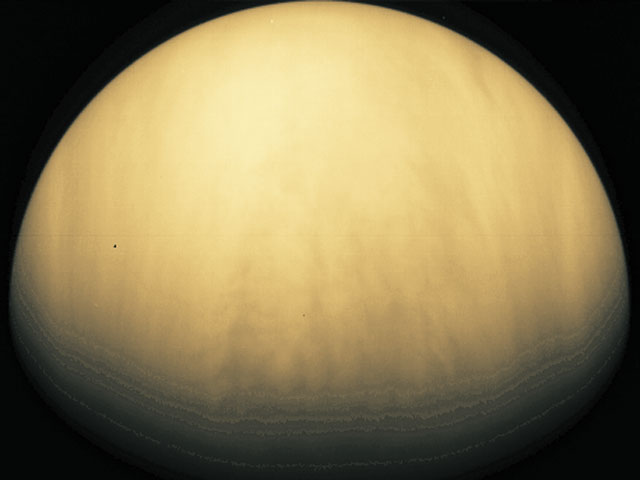Credit & Copyright: Calvin J. Hamilton
Explanation:
This picture by the
Galileo spacecraft shows just how cloudy
Venus
is.
Venus
is very similar to Earth in size
and mass - and so is sometimes referred to as Earth's sister planet - but
Venus
has a quite different climate.
Venus' thick clouds and closeness to the
Sun
(only Mercury is closer) make it
the hottest planet - much hotter than the
Earth.
Humans could not survive there, and no life of any sort has ever been found.
When Venus is visible it is usually the brightest object in the sky
after the Sun and the Moon.
More than 20 spacecraft have visited
Venus
including Venera 9, which landed on the surface, and
Magellan,
which used radar to peer through the clouds and make a map of the
surface.
This visible light picture of Venus
was taken by the Galileo spacecraft
that orbited Jupiter from 1995 to 2003.
Many things about Venus remain unknown, including the cause of
mysterious bursts of radio waves.
1999 2000 2001 2002 2003 2004 2005 2006 2007 2008 2009 2010 2011 2012 2013 2014 2015 2016 2017 2018 2019 2020 2021 2022 2023 2024 2025 |
Yanvar' Fevral' Mart Aprel' Mai Iyun' Iyul' Avgust Sentyabr' Oktyabr' Noyabr' Dekabr' |
NASA Web Site Statements, Warnings, and Disclaimers
NASA Official: Jay Norris. Specific rights apply.
A service of: LHEA at NASA / GSFC
& Michigan Tech. U.
|
Publikacii s klyuchevymi slovami:
Venus - clouds - Venera - oblaka
Publikacii so slovami: Venus - clouds - Venera - oblaka | |
Sm. takzhe:
Vse publikacii na tu zhe temu >> | |
